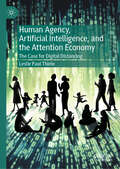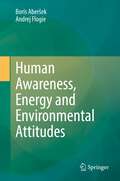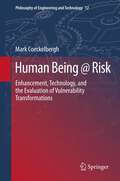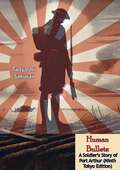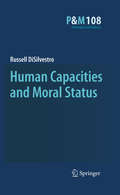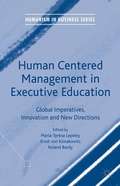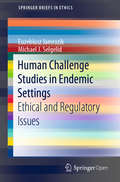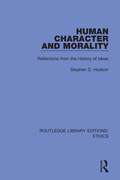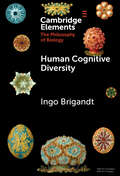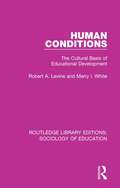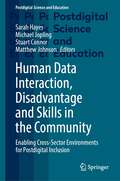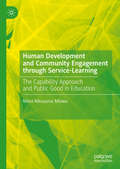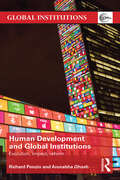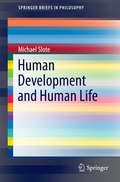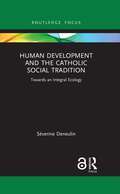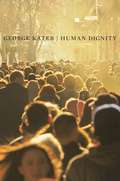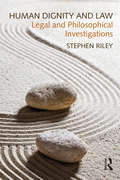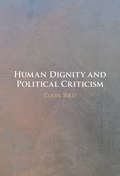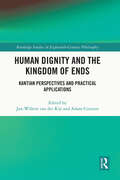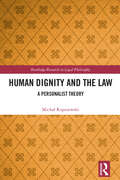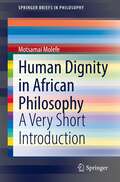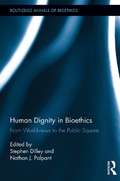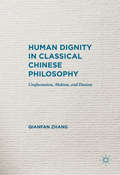- Table View
- List View
Human Agency, Artificial Intelligence, and the Attention Economy: The Case for Digital Distancing
by Leslie Paul ThielePeople relish novelty, enjoy convenience, and are prone to distraction. These natural tendencies are now being dangerously exploited in the digital world. So we find ourselves bewitched by the shimmering screens of our digital devices, like moths circling a flame. It may only be a matter of time before our downward spiral reaches a deadly nadir. Leslie Paul Thiele incisively explores the psychological, social, and political impacts of social media, artificial intelligence, and digital platforms that are designed to capture our attention and maximize engagement. Digital technologies offer countless benefits. But in the attention economy, they also heighten distraction and dependence, erode cognitive and social skills, proliferate misinformation, amplify political polarization, increase social isolation, and leave us despondent. Governmental regulation is needed, but it cannot replace the individual’s responsibility to exercise self-governance. Thoroughly grounded in the latest scientific research but accessible to the general reader, this book explains how we can cultivate the dispositions, habits, and skills needed to sustain human agency and strengthen democratic prospects. In an age of incessant technological upgrading, Thiele demonstrates a vital and practical means to avert human downgrading.
Human Awareness, Energy and Environmental Attitudes
by Boris Aberšek Andrej FlogieThis book raises awareness about environmental issues that result from energy production, extraction and conversion, and examines the attitudes people have about these issues. It discusses societal and educational relations associated with energy and environmental issues, focusing on philosophical, sociological and psychological views, and provides an analysis of how the individual and the society perceive, process and analyze the information on this subject. The authors present the concept of environmentally conscious engineering, discussing various forms of energy extraction and production, and detail alternative, under-researched and unaffordable solutions, such as nuclear fusion and artificial photosynthesis. The book also touches on topics such as the storage of energy and greenhouse gases, recycling and reuse of energy waste, and energy saving and efficiency. The book will be of interest to students and researchers of environmentally conscious engineering, energy use, and human dimensions of ecology and the environment, as well as NGOs, policy makers, and environmental activists.
Human Being @ Risk: Enhancement, Technology, and the Evaluation of Vulnerability Transformations
by Mark CoeckelberghWhereas standard approaches to risk and vulnerability presuppose a strict separation between humans and their world, this book develops an existential-phenomenological approach according to which we are always already beings-at-risk. Moreover, it is argued that in our struggle against vulnerability, we create new vulnerabilities and thereby transform ourselves as much as we transform the world. Responding to the discussion about human enhancement and information technologies, the book then shows that this dynamic-relational approach has important implications for the evaluation of new technologies and their risks. It calls for a normative anthropology of vulnerability that does not ask which objective risks are acceptable, how we can become invulnerable, or which technologies threaten human nature, but which vulnerability transformations we want. To the extent that we can steer the growth of new technologies at all, this tragic and sometimes comic project should therefore be guided by what we want to become.
Human Beings in International Relations
by Jacobi, Daniel and Freyberg-Inan, Annette Daniel Jacobi Annette Freyberg-InanSince the 1980s, the discipline of International Relations has seen a series of disputes over its foundations. However, there has been one core concept that, although addressed in various guises, had never been explicitly and systematically engaged with in these debates: the human. This volume is the first to address comprehensively the topic of the human in world politics. It comprises cutting-edge accounts by leading scholars of how the human is (or is not) theorized across the entire range of IR theories, old and new. The authors provide a solid foundation for future debates about how, why, and to which ends the human has been or must (not) be built into our theories, and systematically lay out the implications of such moves for how we come to see world politics and humanity's role within it.
Human Bullets: A Soldier's Story of Port Arthur (Ninth Tokyo Edition)
by Tadyoshi SakuraiTadyoshi Sakurai’s Human Bullets: A Soldier's Story of Port Arthur is a gripping firsthand account of the Russo-Japanese War (1904–1905), offering an unflinching look at the brutal realities of warfare. Written by a Japanese officer who fought in the Siege of Port Arthur, this memoir provides a rare and vivid perspective on one of the most significant military campaigns of the early 20th century.Sakurai’s narrative captures the courage, sacrifice, and unyielding spirit of the Japanese soldiers as they faced overwhelming odds in their quest to seize the heavily fortified Russian stronghold of Port Arthur. Through his candid descriptions, he conveys the physical and emotional toll of the battlefield, detailing the grueling assaults, the devastating losses, and the camaraderie among his comrades. The title, Human Bullets, reflects the soldiers’ unwavering dedication and willingness to serve as the very instruments of their nation’s military strategy.Beyond the harrowing combat scenes, Sakurai reflects on the larger themes of loyalty, patriotism, and the human cost of war. His writing is both raw and poignant, offering insights into the mindset of a soldier shaped by duty and honor.Human Bullets is not only a historical document but also a powerful anti-war statement that underscores the futility and tragedy of conflict. It remains a valuable resource for historians, military enthusiasts, and anyone seeking to understand the complexities of war from a deeply personal perspective.
Human Capacities and Moral Status
by Russell DisilvestroMany debates about the moral status of things--for example, debates about the natural rights of human fetuses or nonhuman animals--eventually migrate towards a discussion of the capacities of the things in question--for example, their capacities to feel pain, think, or love. Yet the move towards capacities is often controversial: if a human's capacities are the basis of its moral status, how could a human having lesser capacities than you and I have the same "serious" moral status as you and I? This book answers this question by arguing that if something is human, it has a set of typical human capacities; that if something has a set of typical human capacities, it has serious moral status; and thus all human beings have the same sort of serious moral status as you and I. Beginning from what our common intuitions tell us about situations involving "temporary incapacitation"--where a human organism has, then loses, then regains a certain capacity--this book argues for substantive conclusions regarding human fetuses and embryos, humans in a permanent vegetative state, humans suffering from brain diseases, and humans born with genetic disorders. Since these conclusions must have some impact on our ongoing moral and political debates about the proper treatment of such humans, this book will be useful to professionals and students in philosophy, bioethics, law, medicine, and public policy.
Human Centered Management in Executive Education: Global Imperatives, Innovation and New Directions (Humanism in Business Series)
by Maria-Teresa Lepeley Roland Bardy Ernst KimakowitzHuman Centered Management in Executive Education provides a comprehensive insight on innovation in Executive Education with a unique global scope. The book integrates studies and experiences of 32 distinguished scholars from 15 countries who are working in the development of theories and practices to advance the human centered management paradigm, sustainability-based quality standards and continuous improvement in education. The discussion presents a well-balanced outlook that combines and contrasts research and programs from 16 developed and 16 developing countries, and the visions of 10 female and 22 male authors from North America, South America, Europe, Asia, the Middle East and Africa.
Human Challenge Studies in Endemic Settings: Ethical and Regulatory Issues (SpringerBriefs in Ethics)
by Michael J. Selgelid Euzebiusz JamrozikThis open access book provides an extensive review of ethical and regulatory issues related to human infection challenge studies, with a particular focus on the expansion of this type of research into endemic settings and/or low- and middle-income countries (LMICs). Human challenge studies (HCS) involve the intentional infection of research participants, and this type of research is rapidly increasing in frequency worldwide. HCS are widely considered to be an especially promising approach to vaccine development, including for pathogens endemic to LMICs. However, challenge studies are sometimes controversial and raise complex ethical issues, some of which are especially salient in endemic and/or LMIC settings. Informed by qualitative interviews with experts in infectious diseases and bioethics, this book highlights areas of ethical consensus and controversy concerning this kind of research. As the first volume to focus on ethical issues associated with human challenge studies, it sets the agenda for further work in this important area of global health research; contributes to current debates in research ethics; and aims to inform regulatory policy and research practice. Insofar as it focuses on HCS in (endemic) settings where diseases are present and/or widespread, much of the analysis provided here is directly relevant to HCS involving pandemic diseases including COVID19.
Human Character and Morality: Reflections on the History of Ideas
by Stephen D. HudsonOriginally published in 1986, this book explores the animating qualities of human character and moral thought and discusses how they place constraints on the adequacy of moral theories. It evaluates some of the major theories in the history of ethics, notably the moral thoughts of Sidgwick, Kant, Aristotle and Hume. The book examines questions of fundamental importance to all of us and broadens the scope and wisdom of analytical philosophy by conveying the excitement of original philosophical research.
Human Cognitive Diversity (Elements in the Philosophy of Biology)
by Ingo BrigandtWe humans are diverse. But how to understand human diversity in the case of cognitive diversity? This Element discusses how to properly investigate human behavioural and cognitive diversity, how to scientifically represent, and how to explain cognitive diversity. Since there are various methodological approaches and explanatory agendas across the cognitive and behavioural sciences, which can be more or less useful for understanding human diversity, a critical analysis is needed. And as the controversial study of sex and gender differences in cognition illustrates, the scientific representations and explanations put forward matter to society and impact public policy, including policies on mental health. But how to square the vision of human cognitive diversity with the assumption that we all share one human nature? Is cognitive diversity something to be positively valued? The author engages with these questions in connection with the issues of neurodiversity, cognitive disability, and essentialist construals of human nature.
Human Conditions: The Cultural Basis of Educational Developments (Routledge Library Editions: Sociology of Education #32)
by Merry I. White Robert A LevineFirst published in 1986, this book proposes and illustrates a new approach to the comparative analysis of educational policy, based on anthropological and historical inquiry. It reviews the transitions of Western countries, Japan, and the People’s Republic of China and in doing so investigates cultural ideas of human potential and how they inform social and economic goals of education. An analysis of the problems and emerging patterns in developing countries reveals how and why the meanings of life for the majority of their populations were still influenced by agrarian cultural models, even after the introduction of new educational and occupational careers. In place of universalistic economic models and homogenous modernization strategies, the authors propose that culture-specific meanings of education are determined by each country’s particular transition from its agrarian past to its socio-economic conditions at the time. They argue that change in educational development has been as varied in ends, means and significance outcomes as the cultures in which it has occurred and point to the need for a deeper understanding of cultural contexts in which policy choices and development plans are made.
Human Data Interaction, Disadvantage and Skills in the Community: Enabling Cross-Sector Environments for Postdigital Inclusion (Postdigital Science and Education)
by Sarah Hayes Matthew Johnson Stuart Connor Michael JoplingThe book provides a dynamic, cross-sectional, multidisciplinary perspective and dialogue to illuminate the challenges humans face in their interactions with data in their individual postdigital contexts in local communities. It offers unique insights from real cases, collaborations, and projects to extend existing academic theories and frameworks, applied to human data interactions, disadvantage, and digital skills. The book takes the novel approach of establishing co-authorship between cross-sector practitioners from the wider community (such as local authorities, councils, policy makers, small businesses, charities, education and skills providers, and other stakeholders) with international academics and researchers who write about humans, digital skills, and data. This develops an enabling cross-sector environment throughout the book that not only furthers broader understandings concerning data, disadvantage and digital skills in postdigital society, but also shares a template to support others who may wish to adopt this approach to co-authorship and knowledge exchange.The book revisits the Human Data Interaction (HDI) framework (Mortier, Haddadi, Henderson, McAuley, and Crowcroft 2014) through many diverse cross-sectoral perspectives. These are co-authored under the HDI framework’s key tenets of: agency, legibility, negotiability and resistance. These tenets form the main sections of the book, with chapters examining these concepts through both interdisciplinary academic literature and cross-sector dialogue with individuals and agencies from the wider community who work with diverse and often disadvantaged groups.
Human Development and Community Engagement through Service-Learning: The Capability Approach and Public Good in Education
by Ntimi Nikusuma MtawaThis book establishes community engagement and service-learning as pathways to advancing human development and common good. Using the human development and capability approach as normative frameworks, with South Africa as a frame of reference, the author investigates the theoretical contributions and ultimate benefits of university-community partnerships. In doing so, this book demonstrates that three interrelated capabilities – affiliation, common good professionals and local citizenship – are developed through community engagement and service-learning. Subsequently, the notion of transformative change through community engagement and service-learning is illuminated, particularly when operating within the context of power differentials, inequality and extreme poverty. This book will be of interest and value to students and scholars of service-learning, and its implications for partnerships between universities and external communities.
Human Development and Global Institutions: Evolution, Impact, Reform (Global Institutions)
by Arunabha Ghosh Richard PonzioThis book provides a timely and accessible introduction to the foundational ideas associated with the human development school of thought. It examines its conceptual evolution during the post-colonial era, and discusses how various institutions of the UN system have tried to engage with this issue, both in terms of intellectual and technical advance, and operationally. Showing that human development has had a profound impact on shaping the policy agenda and programming priorities of global institutions, it argues that human development has helped to preserve the continued vitality of major multilateral development programs, funds, and agencies. It also details how human development faces new risks and threats, caused by political, economic, social, and environmental forces which are highlighted in a series of engaging case studies on trade, water, energy, the environment, democracy, human rights, and peacebuilding. The book also makes the case for why human development remains relevant in an increasingly globalized world, while asking whether global institutions will be able to sustain political and moral support from their member states and powerful non-state actors. It argues that fresh new perspectives on human development are now urgently needed to fill critical gaps across borders and entire regions. A positive, forward-looking agenda for the future of global governance would have to engage with new issues such as the Sustainable Development Goals, energy transitions, resource scarcity, and expansion of democratic governance within and between nations. Redefining the overall nature and specific characteristics of what constitutes human progress in an increasingly integrated and interdependent world, this book serves as a primer for scholars and graduate students of international relations and development. It is also relevant to scholars of economics, political science, history, sociology, and women’s studies.
Human Development and Human Life
by Michael SloteThis book begins with a discussion of the human life cycle and then uses that discussion and other ideas to paint a general picture of what human lives are like. While the first part looks at human development and change, the second part of the book explores what all human lives are like. Philosophical ideas and methods are central to this book, although it is difficult to subcategorize it into any familiar subdiscipline of philosophy. It draws on modern concepts from psychology and social science in order to portray an image of human life and lives and to enable readers to easily understand the notion of human development in a very specific and directed way. Although cognitive development and the development of motor skills are two examples of forms of human development, this book homes in on a particular, and arguably more synoptic, way of seeing our development, which is in relation to and occurs within the human life cycle. This book is an enlightening read for a broad range of philosophy scholars, articulating and defending a view that is neither as pessimistic nor as optimistic about human life as previous views have been.
Human Development and the Catholic Social Tradition: Towards an Integral Ecology (Routledge Research in Religion and Development)
by Séverine DeneulinThis book brings development theory and practice into dialogue with a religious tradition in order to construct a new, transdisciplinary vision of development with integral ecology at its heart. It focuses on the Catholic social tradition and its conception of integral human development, on the one hand, and on the works of economist and philosopher Amartya Sen which underpin the human development approach, on the other. The book discusses how these two perspectives can mutually enrich each other around three areas: their views on the concept and meaning of development and progress; their understanding of what it is to be human – that is, their anthropological vision; and their analysis of transformational pathways for addressing social and environmental degradation. It also examines how both human development and the Catholic social tradition can function as complementary analytical lenses and mobilizing frames for embarking on the journey of structural and personal transformation to bring all life systems, human and non-human, back into balance. This book is written for researchers and students in development studies, theology, and religious studies, as well as professional audiences in development organizations.
Human Dignity
by Aharon BarakHuman dignity is now a central feature of many modern constitutions and international documents. As a constitutional value, human dignity involves a person's free will, autonomy, and ability to write a life story within the framework of society. As a constitutional right, it gives full expression to the value of human dignity, subject to the specific demands of constitutional architecture. This analytical study of human dignity as both a constitutional value and a constitutional right adopts a legal-interpretive perspective. It explores the sources of human dignity as a legal concept, its role in constitutional documents, its content, and its scope. The analysis is augmented by examples from comparative legal experience, including chapters devoted to the role of human dignity in American, Canadian, German, South African, and Israeli constitutional law.
Human Dignity
by George KatebWe often speak of the dignity owed to a person. And dignity is a word that regularly appears in political speeches. Charters are promulgated in its name, and appeals to it are made when people all over the world struggle to achieve their rights. But what exactly is dignity? When one person physically assaults another, we feel the wrong demands immediate condemnation and legal sanction. Whereas when one person humiliates or thoughtlessly makes use of another, we recognize the wrong and hope for a remedy, but the social response is less clear. The injury itself may be hard to quantify. Given our concern with human dignity, it is odd that it has received comparatively little scrutiny. Here, George Kateb asks what human dignity is and why it matters for the claim to rights. He proposes that dignity is an “existential” value that pertains to the identity of a person as a human being. To injure or even to try to efface someone’s dignity is to treat that person as not human or less than human—as a thing or instrument or subhuman creature. Kateb does not limit the notion of dignity to individuals but extends it to the human species. The dignity of the human species rests on our uniqueness among all other species. In the book’s concluding section, he argues that despite the ravages we have inflicted on it, nature would be worse off without humanity. The supremely fitting task of humanity can be seen as a “stewardship” of nature. This secular defense of human dignity—the first book-length attempt of its kind—crowns the career of a distinguished political thinker.
Human Dignity and Law: Legal and Philosophical Investigations
by Stephen RileyThis book argues that human dignity and law stand in a privileged relationship with one another. Law must be understood as limited by the demands made by human dignity. Conversely, human dignity cannot be properly understood without clarifying its interaction with legal institutions and legal practices. This is not, then, a survey of the uses of human dignity in law; it is a rethinking of human dignity in relation to our principles of social governance. The result is a revisionist account of human dignity and law, one focused less on the use of human dignity in our regulations and more on its constitutive implications for the governance of the public realm.The first part conducts a wide-ranging moral, legal and political analysis of the nature and functions of human dignity. The second part applies that analysis to three fields of legal regulation: international law, transnational law, and domestic public law.The book will appeal to scholars in both philosophy and law. It will also be of interest to political theorists, particularly those working within the liberal tradition or those concerned with institutional design.
Human Dignity and Political Criticism
by Colin BirdMany, including Marx, Rawls, and the contemporary 'Black Lives Matter' movement, embrace the ambition to secure terms of co-existence in which the worth of people's lives becomes a lived reality rather than an empty boast. This book asks whether, as some believe, the philosophical idea of human dignity can help achieve that ambition. Offering a new fourfold typology of dignity concepts, Colin Bird argues that human dignity can perform this role only if certain traditional ways of conceiving it are abandoned. Accordingly, Bird rejects the idea that human dignity refers to the inherent worth or status of individuals, and instead reinterprets it as a social relation, constituted by affects of respect and the modes of mutual attention which they generate. What emerges is a new vision of human dignity as a vital political value, and an arresting vindication of its role as an agent of critical reflection on politics.
Human Dignity and the Kingdom of Ends: Kantian Perspectives and Practical Applications (Routledge Studies in Eighteenth-Century Philosophy)
by Adam Cureton Jan-Willem van der RijtThis book advances our understanding of the nature, grounds and limits of human dignity by connecting it with Kant’s notion of an ideal moral community, or "Kingdom of Ends". It features original essays by leading Kant scholars and moral and political philosophers from around the world. Although Kant’s influential injunction to treat humanity as an end in itself and never merely as a means has garnered the most attention among those interested in analyzing human dignity with a Kantian lens, Kant himself places much more emphasis on the Kingdom of Ends as crucial for defining human dignity. The chapters in this collection focus not only on interpretive issues related to the Kingdom of Ends but also on practical applications that have the potential to advance discussions about the nature and foundations of rights, the content of moral principles, the importance of moral ideals and attitudes and the nature of moral motivation. Exploring and connecting the ideas of human dignity and the Kingdom of Ends significantly deepens our moral understanding, advances discussions in moral and political philosophy and enhances our appreciation of Kant’s moral theory. Human Dignity and the Kingdom of Ends: Kantian Perspectives and Practical Applications will appeal to scholars and advanced students of Kant, moral philosophy, political philosophy, and political theory.
Human Dignity and the Law: A Personalist Theory (Routledge Research in Legal Philosophy)
by Michał RupniewskiThis book reassesses the relationship between human dignity, law, and specifically the ‘personalist’ school of agency. The work argues that a specific way of appreciating dignity is contained in how law understands the person, and so can be used to improve upon how we explain and interpret the law. Despite considerable differences between jurisdictions as regards human dignity in application, it is argued that the particular weight of human persons is the widely shared focal point. The central claim, therefore, is that the law recognises, and tries to foster, the status of personhood, and, drawing on the work of Karol Wojtyła, the author develops a ‘Status of Personhood Theory’. The book will be of interest to academics and researchers working in the areas of Legal Philosophy, Jurisprudence, Philosophy, Ethics and Political Theory.
Human Dignity in African Philosophy: A Very Short Introduction (SpringerBriefs in Philosophy)
by Motsamai MolefeThis book throws a spotlight on the under-explored African perspective on the mercurial concept of human dignity. To do so, it employs two strategies. In the first instance, it considers African theories of human dignity: (1) vitality; (2) community; (3) Personhood. Secondly, it explores the plausibility of these theories by applying them to select applied ethics themes, specifically: animal ethics, disability ethics and euthanasia. The aim of this book is not to argue for the plausibility of these African theories, but to familiarize the global audience of philosophy, ethics and related disciplines (legal studies, sociology, bioethics and so on) with a neglected African perspective on this vital concept. The books is aimed at scholars of philosophy interested in non-European and specifically African perspective.
Human Dignity in Bioethics: From Worldviews to the Public Square (Routledge Annals of Bioethics)
by Stephen Dilley Nathan J. PalpantHuman Dignity in Bioethics brings together a collection of essays that rigorously examine the concept of human dignity from its metaphysical foundations to its polemical deployment in bioethical controversies. The volume falls into three parts, beginning with meta-level perspectives and moving to concrete applications. Part 1 analyzes human dignity through a worldview lens, exploring the source and meaning of human dignity from naturalist, postmodernist, Protestant, and Catholic vantages, respectively, letting each side explain and defend its own conception. Part 2 moves from metaphysical moorings to key areas of macro-level influence: international politics, American law, and biological science. These chapters examine the legitimacy of the concept of dignity in documents by international political bodies, the role of dignity in American jurisprudence, and the implications—and challenges—for dignity posed by Darwinism. Part 3 shifts from macro-level topics to concrete applications by examining the rhetoric of human dignity in specific controversies: embryonic stem cell research, abortion, human-animal chimeras, euthanasia and palliative care, psychotropic drugs, and assisted reproductive technologies. Each chapter analyzes the rhetorical use of ‘human dignity’ by opposing camps, assessing the utility of the concept and whether a different concept or approach can be a more productive means of framing or guiding the debate.
Human Dignity in Classical Chinese Philosophy
by Qianfan ZhangThis book reinterprets classical Chinese philosophical tradition along the conceptual line of human dignity. Through extensive textual evidence, it illustrates that classical Confucianism, Mohism and Daoism contained rich notions of dignity, which laid the foundation for human rights and political liberty in China, even though, historically, liberal democracy failed to grow out of the authoritarian soil in China. The book critically examines the causes that might have prevented the classical schools from developing a liberal tradition, while affirming their positive contributions to the human dignity concept. Analysing the inadequacies of the western concept of human dignity, the text covers relevant teachings of Kongzi, Mengzi, Xunzi, Mozi, Laozi and Zhuangzi (in comparison with Rousseau). While the Confucian notions of humanity (Ren), righteousness (Yi), and gentleman (Junzi) bear most directly on the conception of dignity, Mohism and Daoism provide salutary corrections to the ossification of the orthodox Confucian practice (Li).
